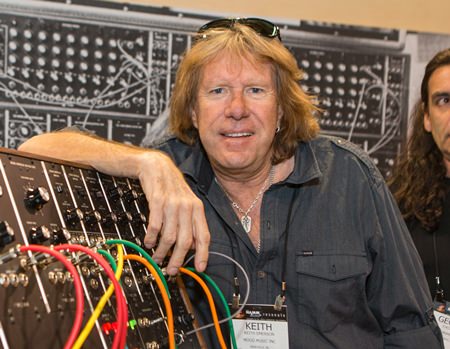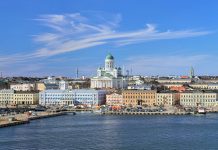Los Angeles (AP) – Keith Emerson, founder and keyboardist of the progressive-rock band Emerson, Lake and Palmer, died last Friday, March 11. He was 71.
Emerson was found at his home with an apparent self-inflicted gunshot wound to the head, and authorities are investigating his death as a possible suicide. His partner Mari Kawaguchi told police that Emerson could have died anywhere between Thursday evening and Friday morning.
Emerson, Palmer and vocalist/guitarist Greg Lake were giants of progressive rock in the 1970s, recording six platinum-selling albums. They and other hit groups such as Pink Floyd, the Moody Blues and Genesis stepped away from rock’s emphasis on short songs with dance beats, instead creating albums with ornate pieces full of complicated rhythms, intricate chords and time signature changes. The orchestrations drew on classical and jazz styles and sometimes wedded traditional rock instruments with full orchestras.
 Musician Keith Emerson is shown in this Jan. 23, 2015 file photo. (Photo by Paul A. Hebert/Invision/AP)
Musician Keith Emerson is shown in this Jan. 23, 2015 file photo. (Photo by Paul A. Hebert/Invision/AP)
Emerson, Lake and Palmer’s 1973 album “Brain Salad Surgery” included a nearly 30-minute composition called “Karn Evil 9” that featured a Moog synthesizer and the eerie, carnival-like lyric: “Welcome back my friends, to the show that never ends.”
A musical prodigy, Emerson was born in Todmorden, Yorkshire in England. By his late teens, he was playing in blues and jazz clubs in London. He helped form one of the first progressive rock groups, the Nice, before hooking up with Lake and Palmer in 1970 and debuting with them at the Isle of Wight Festival, shows that also featured Jimi Hendrix and the Who.
Although they filled stadiums, ELP were also ridiculed as the embodiment of the pomposity and self-indulgence that rock supposedly stood against. When the punk movement took off in the mid-’70s, the band was a special target, openly loathed by the Sex Pistols’ Johnny Rotten among others.
Years later, Rotten (then calling himself John Lydon) and Emerson became friends, Lydon told News of the World in 2007.
“He’s a great bloke,” Lydon said. “I’ve told Keith in no uncertain terms that what put me off his band were those 20-minute organ solos and that film of their convoy of trucks crossing America.”
ELP broke up in 1979, reunited in 1991, later disbanded again and reunited one last time for a 2010 tour.
Throughout, Emerson continued to compose and perform, sometimes solo and other times with various musicians, including Lake.
Emerson’s former bandmate, drummer Carl Palmer, said in a statement that Emerson “was a pioneer and an innovator whose musical genius touched all of us in the worlds of rock, classical and jazz.”
Despite his influence, Emerson never considered himself a rock or pop icon and his true musical devotion lay elsewhere.
“At home, he listened to either classical or jazz. We never listened to rock,” Kawaguchi said.
“He hated being called rock star or prog-rock star…he wanted to be known as composer,” she said. “He never succumbed to being commercially successful. He had no interest. He always said: ‘I’m not a rock star. I’ve never been a rock star. All I want is to play music.’”
Kawaguchi said Emerson was able to compose without any instrument.
“He was just natural. The music was always in his head, always,” she said. “Even when he was sleeping, you know, I could tell he was always thinking about music. Sometimes he would wake up and compose music. And it was all so, so beautiful.”
Emerson had been composing and working with internationally known symphonies, including two in Germany and Japan, and was about to embark on a short tour in Japan starting on April 14 with his band, Kawaguchi said. His work included a classical piano concerto.
“All these people from the classical world were playing his music,” she said. “When he was young, he was using classical music for rock and now the wheel has turned and now the classical world is using his compositions.”




